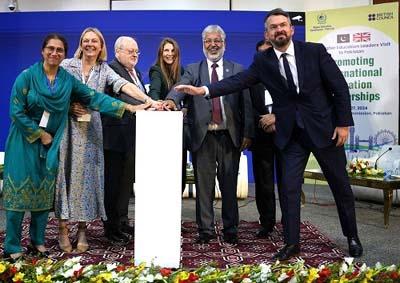
Queen Mary attends UK HE Transnational Education Mission to Pakistan
Celina Ali
Islamabad: Queen Mary University of London recently joined a UK higher education delegation on a 5-day visit to Pakistan this week.
Led by the UK government’s International Education Champion, Sir Steve Smith, the delegation comprised senior representatives from the UK government, 15 leading UK higher education providers and key stakeholders from across the sector
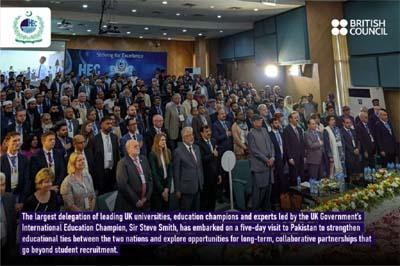
Co-organised by the Higher Education Commission of Pakistan (HEC), the British High Commission, British Council in Pakistan, the Department for Business and Trade (DBT) and the Department for Education (DfE), the visit aimed at further realising the objectives of the flagship initiative Pakistan-UK Education Gateway, which launched in 2018.
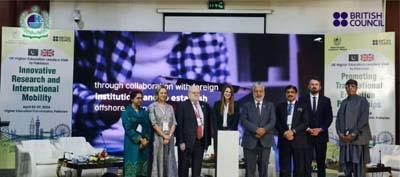
At the opening event, the delegation was welcomed by HEC Chairman Dr Mukhtar Ahmed and Pakistan’s Federal Minister for Education and Professional Training, Dr Khalid Maqbool Siddiqui. Central to the event was the launch of the Transnational Education (TNE) Policy between Pakistan and UK. Speaking on the occasion, Federal Minister Dr. Khalid Maqbool Siddiqui said that such collaborations will serve as a bridge between the two countries. Pakistan’s government, he said, would leave no stone unturned to support such initiatives in Pakistan for the development of the higher education sector.
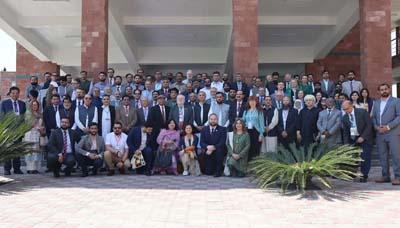
The group also met with Pakistan’s newly appointed Prime Minister, Shehbaz Sharif, who emphasised the importance of promoting quality education. He praised the UK’s support for Pakistan’s education sector and the long-standing bilateral engagement between both countries. Prime Minister Sharif also outlined his commitment to ensure that every child has access to education and highlighted the opportunities for universities to strengthen collaboration in both research and technology.
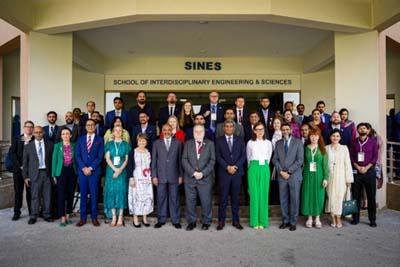
The Pak-UK Education Gateway builds on existing collaborations between the UK and Pakistan that the British Council and Higher Education Commission has facilitated over the last fifteen years: from knowledge exchange and leadership development programmes to student and teacher training, scholarships and research collaborations.
Clare Burke, Head of International Partnerships at Queen Mary University of London, said: “Pakistan is an important market for both the UK government and Queen Mary. Currently there are over 400 students from Pakistan studying at Queen Mary and the visit highlighted the increasing demand for Higher Education in Pakistan. We have been engaging with the HEC and the British Council on a number of initiatives under the Pak-UK Education Gateway, including the British Council Women in STEM scholarship scheme and research projects with colleagues from Pakistan-based universities such as the ‘HepFreePack’ study on the treatment of hepatitis C in Pakistan. The visit provided a forum to engage with Pakistani institutions and we are looking forward to forging more joint initiatives and partnerships in the future.”
HEC Chairman Dr Mukhtar Ahmed said: “The TNE policy aims at prompting access to high quality international education to a wider society and advance social and economic development. I am confident that the visit will unfold huge opportunities for enhancing person to person and institution to institution cooperation on sustainable basis for mutual dividends.”
Sir Steve Smith, the UK Government’s International Education Champion said: “Building on the positive momentum of our work in Pakistan, I’m thrilled to lead this delegation. Pakistan’s dynamic higher education sector boasts impressive growth, and we see immense potential for collaboration. We are committed to fostering partnerships that create a lasting impact through knowledge exchange and joint initiatives.”
Jane Marriott, the British High Commissioner to Pakistan said: “The UK and Pakistan share a long history of educational exchange, and this visit signifies our unwavering commitment to strengthening these ties further. By working together, our universities can address global challenges, cultivate future-ready graduates, and contribute to the continued growth of Pakistan’s higher education sector.”
